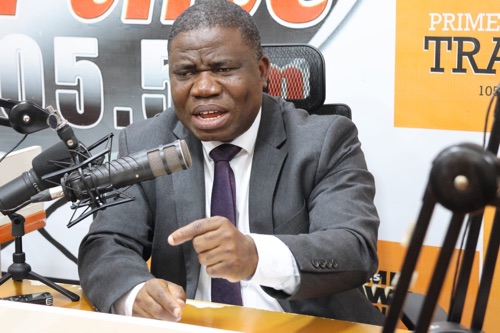Monrovia, Liberia —Deputy Finance Minister for Economic Management, Hon. Dehpue Y. Zuo, says Liberia has entered a new economic chapter in which the national budget is overwhelmingly financed through domestic revenue—a development he describes as a major vote of confidence in President Joseph N. Boakai’s leadership and the nation’s economic direction.
Speaking on Hon. Prime Morning Drive on Thursday, Zuo disclosed that 94% of the national budget is now funded domestically, with only a small fraction coming from external assistance. He noted that the country’s ability to raise over US$1.1 billion internally reflects growing public trust, strengthened fiscal discipline, and expanding national economic potential.
“We are no longer discussing millions of dollars; we are debating billions,”
Deputy Minister Zuo
“That is a positive sign for a post-war economy.”
A “Billion-Dollar Generation”
Hon. Zuo argued that Liberia has now transitioned into what he calls a “billion-dollar generation,” driven by improved tax compliance, greater accountability, and citizens’ increased engagement with how public money is managed.
He credited this shift to President Boakai’s leadership style, asserting that Liberians are more willing to pay taxes because they believe the administration values transparency.
“You have a president who is working based on integrity. People now feel confident asking where the money is going, how it is spent, and how the economy is being built,” he said.
Deputy Minister Zuo added that once off-budget donor financing such as World Bank and UN-funded projectsbis fully captured and publicly reported, Liberia’s total resource envelope will be even larger.
Recurrent Expenditure vs. Essential Public Investment
Responding to criticism of the 2026 draft budget, which allocates approximately US$928 million to recurrent expenditure, Hon. Zuo urged the public to understand the economic context behind these classifications.
He explained that compensation for employees, subsidies to hospitals and universities, rent, and debt servicing are often mislabeled as “waste,” despite being essential government obligations.
Deputy Minister Zuo emphasized that slashing salaries is not an option, noting that past reliance on volunteer teachers and nurses led to instability in health and education services.
“How many people want to work in government as volunteers?” he asked.
“A volunteer teacher can decide not to teach tomorrow. A volunteer nurse can decide not to report to work. Income is a function of life.”
He added that the government is gradually improving wages for security forces, health workers, engineers, and statisticians professions critical to national development.
Stabilizing Wage Bill
The Deputy Minister noted that the wage bill stood at US$315 million in 2023, accounting for nearly 38% of the national budget at the time. However, the government has kept the wage bill generally stable while significantly increasing domestic revenue, thereby reducing its proportion of total spending.
For 2025, the wage bill is US$316 million, and is projected to rise modestly to US$329 million in 2026 due to the formalization of 2,000 volunteers, the creation of new institutions, and adjustments for technical positions.
He stressed that these increases are based on national needs not political considerations.
“These decisions are demand-driven. We are not trying to satisfy political actors; we are solving technical problems.”
Debt Responsibility and Investor Confidence
Minister Zuo also highlighted the government’s commitment to servicing both domestic and external debt on schedule, comparing fiscal responsibility to trust between neighbors.
“If you borrow from your neighbor and don’t pay, they will never lend to you again,” he said.
He emphasized that timely debt repayment has strengthened Liberia’s credibility with development partners, enabling greater access to project financing.
Inclusive Governance and a Vision Beyond Elections
Addressing claims that the administration is borrowing ideas from political opponents who previously proposed a billion-dollar budget, Hon. Zuo said the current achievement is rooted in real data—not politics.
He praised President Boakai’s inclusive approach, which brings together professionals from diverse backgrounds, regardless of political affiliation.
“This government is not fighting for the next election; it is fighting for the next generation.”
Zuo encouraged Liberians at home and abroad to contribute constructively to national development.
“The more we are challenged, the more we know we are moving.”
Tax Adjustments and Long-Term Sustainability
Responding to public concerns about increases in certain tax categories, Deputy Minister Zuo explained that the reforms are part of a long-term strategy to reduce reliance on external borrowing and strengthen Liberia’s financial independence.
“We understand the concerns around tax increases, but these adjustments are necessary for the country to grow,” he said.
“Liberia cannot build the future we want without Liberians contributing their fair share.”
He assured citizens that the return on their tax contributions will be visible and measurable in the coming years, emphasizing the government’s commitment to transparency and efficient public spending.
“You pay your tax, we build your roads; you pay your tax, we build your schools and hospitals.”
Hon. Zuo said the administration is prioritizing road connectivity, improved healthcare facilities, upgraded public schools, and essential social programs, investments he believes will reduce daily hardship, stimulate job creation, attract private-sector confidence, and raise living standards nationwide.
